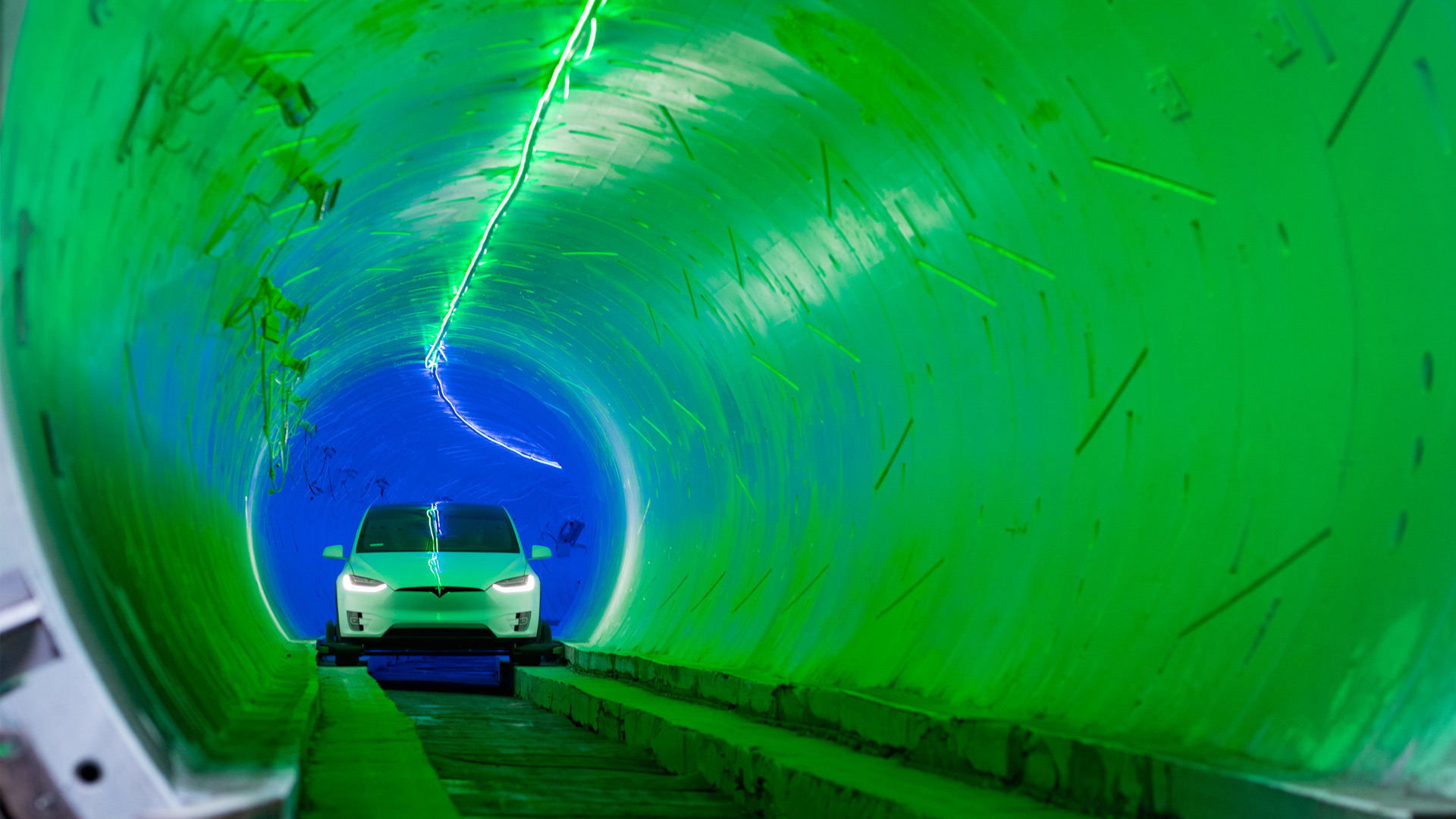Boring's Las Vegas Tunnel is no wormhole
Opinion: The first big public test for Elon Musk's next-gen transportation system was a bumper-to-bumper ride

Sign up for breaking news, reviews, opinion, top tech deals, and more.
You are now subscribed
Your newsletter sign-up was successful
If there's one thing I regret about not visiting CES 2022 in person, it's missing out on an opportunity to take a ride through Elon Musk's Boring Tunnel in Las Vegas.
In, hindsight, though, I count myself lucky.
Instead of a wormhole that transported convention-goers from one end of the conference center to the other in a flash, the Boring Company's 1.7-mile loop experienced a traffic jam -- and seemed less like a next-gen people mover than a concrete example of hubris.
Elon Musk is one of the most successful entrepreneurs in history, launching a successful electric car company, Tesla, a private space company, SpaceX, that's on the cusp of taking us back to the Moon and beyond, and more. But does everything he touch turn to gold? Not quite.
The big dig
Musk's obsession with travel on the ground, more specifically traffic, has not borne the same kind of fruit as his space dreams and cars. The ideas he's cooked up while, I'm guessing, waiting in Los Angeles's soul-crushing traffic, have resulted in third-party companies trying -- to this date with little success -- to build sub-hypersonic, tube-based transportation systems, and Musk's five-year-old Boring company digging tunnels in California and Las Vegas.
When Boring completed its inaugural tunnel near SpaceX's headquarters in Hawthorne, CA, in 2018, Musk boasted that the type of 3D tunnel-builder Boring used could ultimately build enough tunnels "to transport everyone in the U.S. in L.A." He did acknowledge, though, that not everyone would want to move to LA.
Still, Musk's point was made. Traffic congestion would be non-existent if only he could build enough of these tunnels underneath L.A and in other traffic-congested locations across the U.S..
Sign up for breaking news, reviews, opinion, top tech deals, and more.
Boring completed work on the Las Vega Loop, which modestly runs from the Las Vegas Convention Center's North Hall to the Encore Hotel and through to the LVCC South Hall, last summer. The long-term goal is an entire network of Boring tunnels to ferry Vegas visitors to and from various casinos, the Sands Convention Center, and, naturally, McCarren Airport.
That's the future. The present is arguably less impressive.
New tube, old problems
In its current configuration, people enter one of the Loop entrances via escalators where they are greeted by a phalanx of Teslas and drivers who shepherd passengers - as many as can fit in a mid-sized Tesla sedan - through the smooth, well-lit tube. Keep in mind, there's no track; the drivers are really only there to monitor the autonomous Teslas through the simple route.
In a video shared on YouTube from the week of CES 2022, a Loop passenger jokes, "Is it boring driving down here with all of this..." but stops short of a punchline as they roll into a Boring traffic jam.
The driver, missing the joke and not reacting to the jam (perhaps he's seen it before), responds without irony, "Oh, you know, when it's busy with new people, it's not too bad, but when it's slow, and by yourself, it kind of gets a little boring."
"So, is there often a lot of traffic here?" asks the passenger.
The Tesla driver goes on to explain that it's not typical but the backup might've been the result of the South Hall doors being closed.
For me, why the traffic jam existed is less important than the fact that it did.
The origin of traffic
I have a friend who says there's no such thing as "Traffic." It's created, he insists, because one person, for no good reason, taps on their brakes, and then the person behind them does it, and so on until traffic is formed. If the first driver didn't brake, it'd be smooth sailing for all.
The point I take from this theory is that it doesn't take much to create traffic or a traffic jam. The hope is a system such as these Boring Tunnels would break the cycle by shielding itself from external forces, like cross-traffic, merged lanes, or one person hitting their brakes.
Except, that's not the case. Because someone braked at the mouth of the Boring tunnel (near that South Hall and maybe because some exit was closed), so did the Teslas behind it until they had a mini traffic jam underneath the ceaselessly ringing bells of Las Vegas's slot machines.
Part of the blame falls on Tesla building only part of the people-mover solution. In order for Boring tunnels to reach their full potential, they need multiple tunnels per route, and it can't be a line of Teslas filling the tube. It's supposed to be bus-like electric vehicles that can move at least thrice as many people at once. Without throughput space and those mass-movers, Boring's tunnels are just smooth tubes that hide highway traffic problems underground. And less visible traffic is still traffic, right?
CES 2022 offered a vision of the future, which if it's anything like Elon's tunnels, might be more boring than we anticipated.

A 38-year industry veteran and award-winning journalist, Lance has covered technology since PCs were the size of suitcases and “on line” meant “waiting.” He’s a former Lifewire Editor-in-Chief, Mashable Editor-in-Chief, and, before that, Editor in Chief of PCMag.com and Senior Vice President of Content for Ziff Davis, Inc. He also wrote a popular, weekly tech column for Medium called The Upgrade.
Lance Ulanoff makes frequent appearances on national, international, and local news programs including Live with Kelly and Mark, the Today Show, Good Morning America, CNBC, CNN, and the BBC.